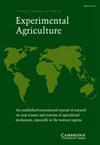Farmers’ heterogeneous preferences for traits of improved varieties: Informing demand-oriented crop breeding in Tanzania
IF 1.9
4区 农林科学
Q1 Agricultural and Biological Sciences
引用次数: 0
Abstract
Summary Understanding farmers’ preferences and willingness to pay for different traits is critical for demand-driven varietal development and designing targeted strategies that stimulate adoption of varieties by farmers. This study uses choice experiment data from a random sample of 1299 Tanzanian farmers to analyze their preferences for traits of groundnut varieties, investigate trade-offs involved in valuation of attributes, and explore heterogeneity in preferences. Results reveal that farmers have strong preferences for groundnut varieties that are high yielding, tolerant to environmental stresses, early-maturing, red-colored, and fetching high sale prices in grain markets. Farmers are willing to pay the highest premium for high-yielding attributes, closely followed by the tolerance trait. Further, a latent class analysis identifies four distinct classes of farmers, confirming considerable heterogeneity in farmers’ preferences for various groundnut traits. A specific distinction is notable between preferences of consumption-oriented and market-oriented farmer classes. Our results have important implications for demand-driven variety development and targeted dissemination of improved varieties.农民对改良品种性状的异质性偏好:为坦桑尼亚需求导向的作物育种提供信息
了解农民对不同性状的偏好和支付意愿对于需求驱动型品种开发和设计有针对性的策略以刺激农民采用品种至关重要。本研究利用随机抽样的1299名坦桑尼亚农民的选择实验数据,分析了他们对花生品种性状的偏好,调查了属性评估中涉及的权衡,并探讨了偏好的异质性。结果表明,农民对高产、耐环境胁迫、早熟、颜色鲜红、在粮食市场上销售价格高的花生品种有强烈的偏好。农民愿意为高产性状支付最高的溢价,紧随其后的是耐受性性状。此外,潜在类别分析确定了四种不同的农民类别,证实了农民对各种花生性状的偏好存在相当大的异质性。以消费为导向的农民阶级和以市场为导向的农民阶级的偏好之间有明显的具体区别。本研究结果对需求驱动型品种开发和改良品种的定向推广具有重要意义。
本文章由计算机程序翻译,如有差异,请以英文原文为准。
求助全文
约1分钟内获得全文
求助全文
来源期刊

Experimental Agriculture
农林科学-农艺学
CiteScore
2.50
自引率
6.20%
发文量
29
审稿时长
24 months
期刊介绍:
With a focus on the tropical and sub-tropical regions of the world, Experimental Agriculture publishes the results of original research on field, plantation and herbage crops grown for food or feed, or for industrial purposes, and on farming systems, including livestock and people. It reports experimental work designed to explain how crops respond to the environment in biological and physical terms, and on the social and economic issues that may influence the uptake of the results of research by policy makers and farmers, including the role of institutions and partnerships in delivering impact. The journal also publishes accounts and critical discussions of new quantitative and qualitative methods in agricultural and ecosystems research, and of contemporary issues arising in countries where agricultural production needs to develop rapidly. There is a regular book review section and occasional, often invited, reviews of research.
 求助内容:
求助内容: 应助结果提醒方式:
应助结果提醒方式:


